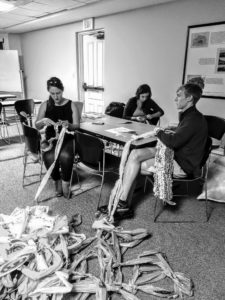Trash to treasure

together to make mats for the homeless.
What are students at Maryville College doing this month? Weaving bags together to make mats for the homeless.
On September 27, Intervarsity Christian Fellowship Club hosted a “Homelessness Awareness Night,” where they watched a documentary about families on the street, and taught students how to cut, tie, and crochet plastic bags into sleeping mats. Eleven people came to help, including a Maryville College Alumnus, two community members, and a nontraditional student.
It all started with members of the Intervarsity Christian Club began collecting plastic grocery bags.
The Intervarsity club is involved in the local homeless ministry, and their members learned how to make mats out of the grocery bags for those living on the streets. They began to collect plastic bags to make the mats. It started small, but soon people who weren’t even in the club were donating plastic bags, including other students and community members.
“I thought it was a neat way to put thoughts into action.” Said, Shelly Scott, a community local member.
Shannon O’Brian, an MC student who donated bags to the event, says she is, “excited to help people by making the mats.”
A staff member in the Intervarsity Club, Andrew Horton, said, “Not only are we going to educate ourselves, we are going to start a movement.” He also said that students should get excited because, “We are going to be recycling a product that you can’t recycle. We are going to be Fit. Green. Happy.”
The mats have many uses, according to Danielle Everett, the president of Intervarsity. They can be used as a sleeping mat for a grown man, or a woman, or even an adult and small child. They can also be used as a blanket when the weather is cold, and as a ‘coat’ of sorts when traveling. The mats each have straps on them that can be used to carry the mat on the back, or to wrap around a body to keep out the cold.
Making the mats is even good for the environment, as Horton mentioned. It takes an average of 1,000 plastic bags to make one mat, according to KSHB, a news station in Kansas that interviewed women making similar mats, this means for every mat there are 1,000 fewer bags going to the dump.
Everett also described how the mats are created using a detailed process. The whole process is called “plarning”, which is a combination of the words plastic and yarning. You first have to cut the bag into strips that form circles. Then you tie the strips together to make a ‘yarn’ of sorts. Finally, you crochet the bags together in rows about 3-feet-wide. The total mat is 3-by-6 feet.
Everett stated that “through this event they hope to help the homeless, learn more about the issue, and engage the campus community as well as those outside Maryville.” She explained that her club had hosted a successful event last year that was to raise awareness about sex trafficking. This year they wanted to “make a difference about an issue” again.
She said that, in the end, “We really hope to have a broad audience that wants to come together to learn about this issue.”
If you would like to be a part of this movement, Intervarsity says they would be happy to accept donations of bags, or instruct you on how to make the mats.
